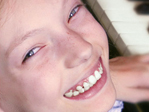Yuliya is 13 years old and is living with type 2 spinal muscular atrophy (SMA). She lives in Kharkiv, Ukraine with her father Vitaliy, her mother Svitlana and her 10-year-old brother Danylo.
Spinal Muscular Atrophy (SMA) is a genetic disease caused by a missing or mutated survival motor neuron gene (SMN1). The mutation means the body does not produce a protein that helps the development of nerves controlling voluntary muscle movement. Without the proper function of these nerves, motor development like crawling, walking, head and neck control and even swallowing are affected. It is very important to stimulate a child with SMA to improve mobility. About 1 in 6,000 people have SMA.
Yuliya’s parents started to notice that she was having difficulties with walking and standing up around her first birthday. Finding a correct diagnosis was not easy due to the rarity of the condition, but after many tests and different conclusions, Yuliya was correctly diagnosed with spinal muscular atrophy. Initially her parents were devastated and impulsively thought that Yuliya’s life and the lives of her family members were shattered. However, after a few days they became more hopeful and confident that Yuliya could still lead a fulfilling life.
Now that Yuliya is 13, they know that their hopes have been realised as their daughter’s life is intensive and fun-filled. Yuliya’s father Vitaliy said, “Yuliya’s usual day is made up of school, evening rest and studying. She also meets with friends—some school friends regularly invite her to go out, to visit the theatre, circus or to go shopping.”
Whilst different rehabilitation procedures can interrupt the fun times, and the disease makes her constantly weaker, Yuliya and her family are generally able to live like any other family—working throughout the week and spending more time together at weekends by going for a walk in the park or swimming. Yuliya and her brother Danylo love playing out together in the street and making up adventurous games. The two of them are a real team, especially when their parents aren’t there, and Danylo always acts like Yuliya’s bodyguard.

Yuliya does not have any professional help at home; her mother Svitlana cares for her as well as helping her with homework and with daily life. Vitaliy says that his wife manages everything, “She is a wonderful woman! She can make a house like a fort and a cosy place at the same time.”
Whilst Svitlana cares for Yuliya every day at home, Vitaliy, has set up a voluntary, non-profit foundation in Ukraine in order to provide support and information to anyone affected by spinal muscular atrophy. Vitaliy knew that it would not be easy to change things singlehandedly but collaborating with others in his country, as well as similar foundations abroad, has helped. “Each day of our lives we are raising awareness among our citizens and doctors through publications and TV programs and pushing forward requests to the Government.”

He believes that the greatest success so far was changing the accessibility to social reimbursement of electrical wheelchairs for disabled children from 5 years old. ‘Right now we are fighting with the state about the closure of a special government programme for rare diseases.’ Vitaliy’s achievements led to him being awarded the EURORDIS Award for Patient Organisations. He then went on to create the National Alliance for his country, the non-governmental organisation ‘Rare Diseases of Ukraine’.
Looking forward to the future, the family is positive. Their goal is to win time for Yuliya and all children in Ukraine. They don’t focus on the negativities that the future might bring; they simply believe that for any problems that arise, they will find a solution.
Meet others who have Spinal Muscular Strophy on the RareConnect discussion group
Download the official Rare Disease Day poster here!

